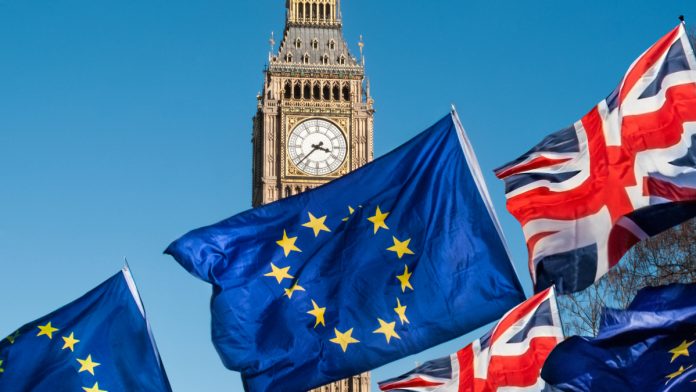The pound held steady versus the euro on Thursday as investors continued digest political developments surrounding Brexit. The pound euro closed the session at €1.1016, which is approximately the same level that it started Thursday at. The pound is seen advancing versus the euro in early trade on Friday.
| What do these figures mean? |
| When measuring the value of a pair of currencies, one set equals 1 unit and the other shows the current equivalent. As the market moves, the amount will vary from minute to minute.
For example, it could be written: 1 GBP = 1.13990 EUR Here, £1 is equivalent to approximately €1.14. This specifically measures the pound’s worth against the euro. If the euro amount increases in this pairing, it’s positive for the pound . Or, if you were looking at it the other way around: 1 EUR = 0.87271 GBP In this example, €1 is equivalent to approximately £0.87. This measures the euro’s worth versus the British pound. If the sterling number gets larger, it’s good news for the euro. |
The pound held relatively steady in the previous session as investors continued assessing the probability of a hard no deal Brexit. Prime Minister Boris Johnson’s decision to suspend Parliament for over a month provoked strong reactions from politicians. The suspension leaves Parliament with very little time to approve legislation to prevent a no deal Brexit. Whilst MP’s have acknowledged that this will be a challenge, it isn’t impossible. Instead the move by Boris Johnson is serving to focus the minds of his opposition.
The headlines today that Boris Johnson is stepping up talks with the EU in order to break the current impasse is offering some support to the pound. However, both sides are also playing down the probability of an imminent break through.
| Why is a “soft” Brexit better for sterling than a “hard” Brexit? |
| A soft Brexit implies anything less than UK’s complete withdrawal from the EU. For example, it could mean the UK retains some form of membership to the European Union single market in exchange for some free movement of people, i.e. immigration. This is considered more positive than a “hard” Brexit, which is a full severance from the EU. The reason “soft” is considered more pound-friendly is because the economic impact would be lower. If there is less negative impact on the economy, foreign investors will continue to invest in the UK. As investment requires local currency, this increased demand for the pound then boosts its value. |
Today there is some second-tier data that investors could glance at. However, Brexit developments will continue to take centre stage.
Euro Struggles Amid Growing Signs Of German Recession
Dismal data from German weighed on broad demand for the euro in the previous session. Data showed that unemployment rose, and inflation slowed in Germany, adding to signs that the economy is running out of steam.
Inflation, as measured by the consumer price index, dropped -0.2% month on month, hitting a lacklustre 1.4% annually, well below the German central bank’s 2% target. Separate data also showed that unemployment rose by 4000 on the month, eroding employment growth that had help support the economy. These figures are just the latest signs that the exporter country’s manufacturing slump is starting to spill over into other areas of the economy.
The euro fell following the release because the dismal data from Germany will almost certainly encourage the European Central Bank to vote in favour of measures to loosen monetary policy when they meet in September.
| Why do raised interest rates boost a currency’s value? |
| Interest rates are key to understanding exchange rate movements. Those who have large sums of money to invest want the highest return on their investments. Higher interest rate environments tend to offer higher yields. So, if the interest rate or at least the interest rate expectation of a country is relatively higher compared to another, then it attracts more foreign capital investment. Large corporations and investors need local currency to invest. More local currency used then boosts the demand of that currency, pushing the value higher. |
Today investors will look to eurozone inflation data. Analysts forecast that inflation will have ticked higher to 1% in August up from 0.9%. However, they predict core inflation, which removes more volatile items such a food and fuel, will have declined to 1%, down from 1.1% in July. This is still some distance from the ECB’s 2% target. A weak reading could send the euro lower as investors asses the probability of looser policy from ECB.
Currencylive.com is a site operated by TransferWise Inc. (“We”, “Us”), a Delaware Corporation.
The content on our site is provided for general information only. It is not intended to amount to advice on which you should rely. You must obtain professional or specialist advice before taking, or retain from, any action on the basis of the content on our site.
Although we make reasonable efforts to update the information on our site, we make no representations, warranties or guarantees, whether express or implied, that the content on our site is accurate, complete or up to date. Some of the content posted on this site has been commissioned by Us, but is the work of independent contractors. These contractors are not employees, workers, agents or partners of TransferWise and they do not hold themselves out as one. The information and content posted by these independent contractors have not been verified or approved by Us. The views expressed by these independent contractors on currencylive.com do not represent our views.





